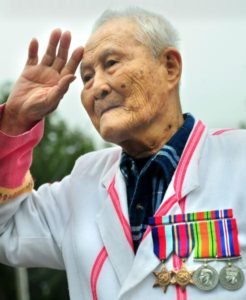Migrants and the meaning of ANZAC

Karen refugee Bordy Weeku fought with the British Army against the Japanese in Burma during WWII.
As the national day of commemoration for Australians who served and died in war, the ANZAC story for a long time invoked an identity that didn’t mirror our growing multicultural society.
But just as the diverse life experiences migrants and refugees have brought to Australia remodelled our notion of nationhood, ANZAC day has increasingly offered new Australians a chance to reflect in different ways on the way war has impacted people and society in their former lands.
“Our nation is shaped by our collective memory,” former Prime Minister Tony Abbott said at the centenary commemoration of the ANZAC landing at Gallipoli in 2015.
“Here at Lone Pine, the pact between the past and the present is renewed for the future, for those who seek to understand what it means to be Australian,” Mr Abbott said.
Those words indicated the persistence of a national identity that ought to be shared in order to understand what it means to be a ‘real’ Australian.
ANZAC was originally a story about the grit and determination shown by the young white men who fought at Gallipoli, despite the ethnic diversity present in the ranks of the first Anzacs and the many women who also volunteered to serve as nurses.
Yet in Melbourne this ANZAC Day, contingents from the Turkish, Hellenic and Vietnamese sub-branches of the RSL will participate in the ANZAC Day march, as they have done for many years.
With more than half of Australia’s population now either born overseas or having at least one parent born overseas, there have been various other attempts to make ANZAC more inclusive of a culturally diverse community.
ANZAC Day has come to mean a day where the nation pays tribute to veterans from different wars and from culturally diverse backgrounds, with descendants of veterans from other wars marching in ANZAC parades around the country.
What they do share however is a recognition of the harsh realities of war, no matter where you and your ancestors come from.
For some in Australia’s Chinese community a traditional day in April each year called Qingmingjie, which means ‘clear and bright’ also serves to commemorates ancestors who served at war.
Chinese migrant Vivian Jiang said the day is spent visiting ancestral graves, preparing food and flowers to place in front of their gravestones and burning paper made to resemble money as an offering to the dead.
“ANZAC Day to me is very similar with the Qingmingjie,” Vivian said,
“I think it’s a great tradition and helps to educate people on the past and the cruelty war can bring,” she said.
“I buy a red flower from people on the street to show my respect and support,” she said.
Descendants of Chinese veterans who fought in World War II against the Japanese marched in Melbourne for the first time in 2016.
Carissa Gilham
Research Officer at AMES Australia












